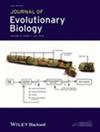Colour polymorphism is prevalent on islands but shows no association with range size in web-building spiders.
IF 2.1
3区 生物学
Q3 ECOLOGY
引用次数: 0
Abstract
One of the most evident sources of phenotypic diversity within a population is colouration, as exemplified by colour polymorphism. This is relevant to a greater extent in animals with visually-biased sensory systems. There is substantial evidence suggesting that different colour morphs can access a broader range of habitats or niches, leading to larger geographic range sizes. However, this hypothesis has been tested in few lineages, comprising species where colour is likely to be involved in sexual selection. Furthermore, some available evidence considers geographical variation as polymorphism, thus limiting our comprehension of how sympatric colour polymorphism can influence a species' geographic range. Through an extensive systematic literature review and a comparative analysis, we examined the relationship between colour polymorphism and range size or niche breadth in web-building spiders. We identified 140 colour polymorphic spider species, belonging mainly to the families Araneidae and Theridiidae. We found no evidence that colour polymorphic species differ significantly from non-polymorphic species in terms of range size and niche breadth, after accounting for phylogenetic relationships and other covariates. However, we did observe that colour polymorphic species were more likely to be found on islands compared to non-polymorphic species. Overall, our results indicate that the association between colour polymorphism and geographic range size may not exist among web-building spiders, or be as pronounced as in other lineages. This suggests that the strength of the association between colour polymorphism and ecological success might depend on the ecological role that colouration plays in each clade.颜色多态性在岛屿上很普遍,但在造网蜘蛛中与分布范围大小没有关联。
种群内表型多样性最明显的来源之一是颜色,颜色多态性就是一个例子。对于具有视觉偏差感官系统的动物来说,这一点更为重要。有大量证据表明,不同的颜色形态可以进入更广泛的栖息地或壁龛,从而导致更大的地理范围。然而,这一假说只在少数几个种系中得到了验证,这些种系包括颜色可能涉及性选择的物种。此外,一些现有证据将地理变异视为多态性,从而限制了我们对同域肤色多态性如何影响物种地理范围的理解。通过广泛的系统文献回顾和比较分析,我们研究了造网蜘蛛的颜色多态性与分布区大小或生态位广度之间的关系。我们发现了 140 种色彩多态性蜘蛛,主要属于蛛科和蛛属。在考虑了系统发育关系和其他协变量之后,我们没有发现任何证据表明颜色多态物种与非多态物种在分布区大小和生态位广度方面有显著差异。不过,我们也观察到,与非多态物种相比,肤色多态物种更有可能出现在岛屿上。总之,我们的研究结果表明,在造网蜘蛛中,颜色多态性与地理分布范围大小之间的联系可能并不存在,或者不像在其他类群中那样明显。这表明,颜色多态性与生态成功之间的关联强度可能取决于颜色在每个支系中所扮演的生态角色。
本文章由计算机程序翻译,如有差异,请以英文原文为准。
求助全文
约1分钟内获得全文
求助全文
来源期刊

Journal of Evolutionary Biology
生物-进化生物学
CiteScore
4.20
自引率
4.80%
发文量
152
审稿时长
3-6 weeks
期刊介绍:
It covers both micro- and macro-evolution of all types of organisms. The aim of the Journal is to integrate perspectives across molecular and microbial evolution, behaviour, genetics, ecology, life histories, development, palaeontology, systematics and morphology.
 求助内容:
求助内容: 应助结果提醒方式:
应助结果提醒方式:


